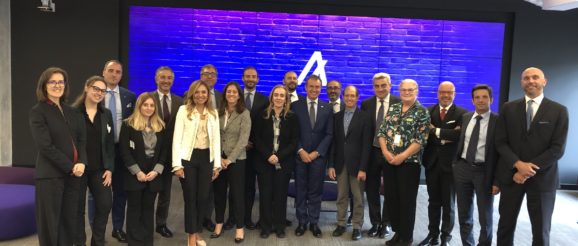The 2019 Edition of Amerigo For Law: Embracing Innovation and Technology – La Voce di New York

Last week saw the successful conclusion of the third edition of Amerigo For Law, a well-established annual cooperative learning program for Italian lawyers and managers. Offered by the Amerigo Association, with the support of the Italian Embassy in Washington D.C. and the Italian Consulate General in Boston, it enables Italian legal professionals to discuss with their U.S. counterparts the issues of innovation and technology transfer.
The concept of this initiative was developed by Avv. Vito Cozzoli, President of the Amerigo Association. Amerigo Association gathers the alumni of the international cultural exchange programs, created under the auspices of the U.S. Department of State’s Bureau of Educational and Cultural Affairs. “When you refuse change, you aren’t standing still, you are moving backwards,” Avv. Cozzoli states, referring to several initiatives developed by Amerigo to support innovation. As a member of the Amerigo Advisory Board, I eagerly share his approach and helped to lead Amerigo For Law from its inception.
Our Team selected “Innovation and Fintech” as the main topic for this year: like many others, we are very interested in these new developments and in the attempts at regulating them. Following the academic program, our Team was addressed by Prof. Chris Brummer, director of the Institute of International Economic Law at Georgetown University in Washington D.C. We were also received at the U.S. Department of Commerce, the Institute of International Finance, the U.S. Consumer Financial Protection Bureau, the U.S. Chamber of Commerce and the lnternational Monetary Fund.
Amerigo For Law Team at Villa with H. E. Armando Varricchio
In the beautiful setting of Villa Firenze, H.E. Armando Varricchio, Ambassador of Italy to the United States, gave us a very warm welcome, hosting a business lunch with Alec Ross, former Senior Advisor for Innovation to Secretary of State Hillary Clinton, who examined different strategies to navigate disruptive change.
We had the opportunity to visit Eni Petroleum offices, at just two blocks from the White House. Dr. Gianni Di Giovanni (Head of Eni International Relations at Washington D.C., and Chairman of several Eni U.S. subsidiariaries) shared his interesting analysis about the forthcoming presidential elections, during a business dinner offered to our Team.
The mainline of the FinTech effort is about applying to the Banking & Finance sector the same technologies already powering Web 2.0 companies, like Google and Facebook. Main drivers of FinTech are the big retailers and the consumer credit industry, striving to offer customers all the fee-based services needed by this new cashless economy.
Clearly, while FinTech is welcome to cut operating costs, concerns have been raised about senior citizens adapting to the new cashless way of life. Moreover, traditional banking still has to switch from its old profit model (positive interest rates covering the hidden cost of services) to a new one, featuring negative interest rates and fee-based services. Small savers, the traditional backbone of banking, have been severely hit by negative interest rates.
Amerigo For Law Team at Italian Consulate General in Boston with Deputy Consul General Emilia Luciani
Some solutions to all these problems are urgently needed, and devising them won’t be an easy task. Meetings with top law firms (Morgan, Lewis & Bockius LLP, Baker McKenzie, Orrick, Herrington & Sutcliffe LLP and Goodwin Procter LLP) offered us the opportunity for comparing regulations and compliance activities in the FinTech industry.
The Massachusetts Institute of Technology, at the spearhead of research and innovation since the thirties, was the perfect setting for the conclusion of the 2019 edition of Amerigo For Law. Lectures were held by Prof. Christian Catalini and Gary Gensler about the evolution of the payment systems industry, from the adoption of the credit card to the development of the blockchain.
Blockchain-based digital assets are the next step in the evolution of money: transactions do not require physical exchange of cash, but only data exchanges between specialized “wallet” programs. A distributed notary system (the blockchain) based on a network of computer servers, records all transactions insuring reliability, publicity and anonymity.
Amerigo For Law Team at MassChallenge – Boston
In Boston, the Amerigo For Law Team visited two startup support organizations, namely, the Boston Branch of the MassChallenge accelerator and the M.I.T. Regional Entrepreneurship Acceleration Program (MIT REAP). Last but not least, we had the opportunity to learn about a very successful combination of Italian excellence and M.I.T. innovation climate.
Prof. Silvio Micali‘s Algorand Inc has become one of the top players in the FinTech revolution. Supported by a cross-industry expert team, Algorand develops new tools for the decentralized economy while still engaging in economic and mathematical research.
Economists, mathematicians, and top-level developers are working together, sharing the collegial and collaborative culture that is the pride of Algorand: “Collaboration always wins over competition and is more fun, too”, says prof. Micali. A recipient of the Turing Award (in computer science), of the Goedel Prize (in theoretical computer science) and the RSA prize (in cryptography), prof. Micali is a member of Accademia dei Lincei, the National Academy of Sciences and of several other academic organizations.
At the conclusion of our visit, a reception for our Team was held by the Italian Consulate General in Boston, at the Federal Reserve Bank building, in front of an amazing view of Boston Harbor.
